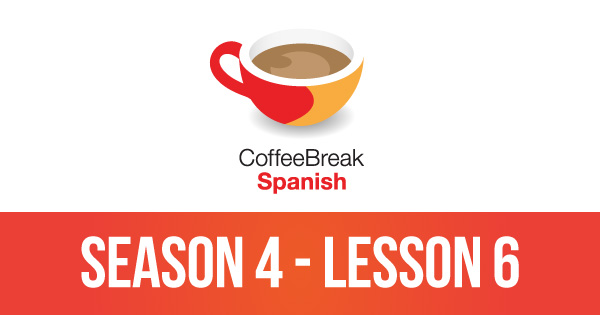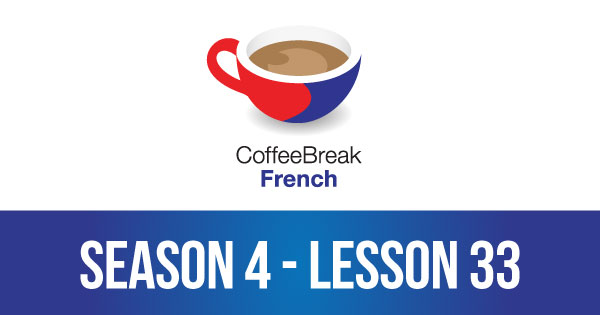In this episode of our advanced Spanish course we listen to María’s latest diary entry in which she reveals an interesting story linked to her family’s past. As usual the episode is rich in idiomatic expressions and complex grammatical points.
Month: April 2015
CBI 1-11 | Ordering drinks in Italian
It’s time for a new lesson of Italian. Join teacher Mark, learner Katie and native speaker Francesca in lesson 11 in our series and learn to order drinks in an Italian café.
Newsletter Activity 7 – antes de or antes de que?
In activity 7, we are thinking about when to use antes de and antes de que which both mean “before”. Do you know how they differ? Antes de is always followed by an infinitive and it is used when there is no change of subject in a sentence:
- antes de llegar, ¡no sabía nada de la sorpresa!
- he llamado a mi novio por teléfono antes de salir por la noche
If there is a change of subject, you need to use antes de que which must be followed by the subjunctive:
- regresamos a casa antes de que empiece a llover
- regresamos a casa antes de que empezara a llover
- antes de que lleguen, vamos a comer
- antes de que salgamos, tendrás que hacer la maleta
Look carefully at the different tenses used in the different examples. Now it’s over to you! Try to come up with a few different sentences to practise using antes de and antes de que. Remember that if you use a past tense in your first clause, the verb that follows antes de que should be in the imperfect subjunctive. There’s quite a lot to think about here so take your time and then share your examples. ¡Esperamos vuestros comentarios!
Newsletter Activity 7 – qu’est-ce qui vous passionne?
In this activity, we are looking at different ways to express your interests by asking you qu’est-ce qui vous passionne le plus dans la vie? There are several ways to answer this. Firstly, you can use the same structure as the question:
- ce qui me passionne le plus dans la vie c’est…
- ce qui m’intéresse c’est l’art moderne
You can use the transitive verb passionner:
- mon travail me passionne – I am passionate about my work
There is also a reflexive structure se passionner pour which means “to have a passion for” or “to be really interested in”:
- mon frère se passionne pour la guitare
Another option is to use the construction être passionné(e) de meaning “to love”:
- elle est complètement passionnée de danse
You could also use the verb s’intéresser but remember that it must be followed by the preposition à:
- je m’intéresse aux livres
- mon mari s’intéresse à la cuisine
- les enfants s’intéressent au football
Can you think of any other ways to express your passions and interests in French? Try writing a sentence or two to practise these constructions. Nous nous passionnons pour l’enseignement du français!
Season 4 – Episode 33 – Coffee Break French
It’s time for another episode in our series for advanced French learners. In this lesson we read the latest email from Monique to her daughter Sylvie. Monique is desperate to hear how Sylvie got on on her date with Matthieu, and as usual Pierre-Benoît and Mark are on hand to discuss the language points contained in the text. In this episode, expressions featured include tourner en rond, la curiosité est un vilain défaut, and lots more.
Amazing Pållöriöf Research into language acquisition
Here at Radio Lingua we like to keep track of what’s happening in the world of research on language acquisition. Scientists at the University of Pållöriöf in northern Finland have discovered that a rare variety of edible hygrocybe known as the yellow waxcap has been linked to improved language skills. Tests were done on students in the language department at the university and it was shown that those who consumed up to 5 yellow waxcaps daily had increased ability to speak and write in the language. Not all waxcaps are edible, so we would strongly advise that you don’t try this at home!
Hmm… Really?
Wouldn’t that be wonderful? Wouldn’t it be great it there were a food that could make your brain more effective as a language learner? Of course, the University of Pållöriöf doesn’t really exist, and if you try rearranging the letters you’ll realise that this is in fact our April Fool! It is, however, worth saying that enjoying the local foods and culture of the country where the language you’re studying is spoken will undoubtedly help you improve your understanding and become “more French” (or Spanish, Italian, German, etc).
Did you know that in France the tradition is to stick a paper fish on people’s backs today, hence the name Poisson d’Avril? And that in most of the Spanish-speaking world, April 1st is just a normal day: instead people play pranks on each other on the 28th December, el día de los Santos Inocentes. Let us know know in the comments about your favourite April Fools – in whichever language you like! And just one further reminder: please do be aware that not all wax caps are edible! You have been warned…
(Photo credit: Tatiana Bulyonkova)
Newsletter Activity 6: the conditional
This blog post is looking at some of the different uses of the conditional.
Forming the conditional is quite straightforward as the endings are the same for -AR, -IR and -ER verbs and you add the endings directly onto the infinitive. The endings are as follows:
- ía > empezaría recibiría volvería
- ías > empezarías recibirías volverías
- ía > empezaría recibiría volvería
- íamos > empezaríamos recibiríamos volveríamos
- íais > empezaríais recibiríais volveríais
- ían > empezarían recibirían volverían
You may notice that these are the same as the -ER and -IR endings in the imperfect tense. It is important to remember that some irregular verbs have a different stem in the conditional (and future) form (i.e not the infinitive like most verbs) but the endings remain the same. Some of the most common verbs with irregular stems in the conditional are listed below.
- decir > dir-
- haber > habr-
- hacer > har-
- poder > podr-
- poner > pondr-
- querer > querr-
- saber > sabr-
- salir > saldr-
- tener > tend-
- venir > vendr-
The conditional can be used in a variety of ways. It can be used to express possibility and talk about hypothetical situations:
- Pensé que llegaríamos a tiempo
It can express a wish or desire:
- Me gustaría vivir en España
- Me encantaría estar de vacaciones
You can also use the conditional to make polite requests:
- ¿Podría decirme la hora por favor?
Can you think of any other situations when you would use the conditional? Try and write a sentence or two of your own using the conditional. If you’re looking for a bit of a challenge, try building a sentence around a si clause. ¡Nos gustaría ver vuestros comentarios!
Newsletter Activity 6 – False Friend: rude
In this newsletter activity, we’re looking at a false friend.
The French word rude in French does not mean the same as the English word “rude”. Can you work out its meaning from the following examples?
- ma professeur est rude, elle ne veut jamais qu’on parle en cours
- je fais de l’escalade, j’ai une rude épreuve qui m’attend demain
This is quite a tricky one. Once you have worked out its meaning, post a comment and try to write a sentence in French which makes the differences in meaning between the French word and the English word obvious. For an extra challenge, try to include other false friends in your comment.
Remember that for every false friend, there are two words to discover, so do you know how to say “rude” in French?
Bonne chance!







